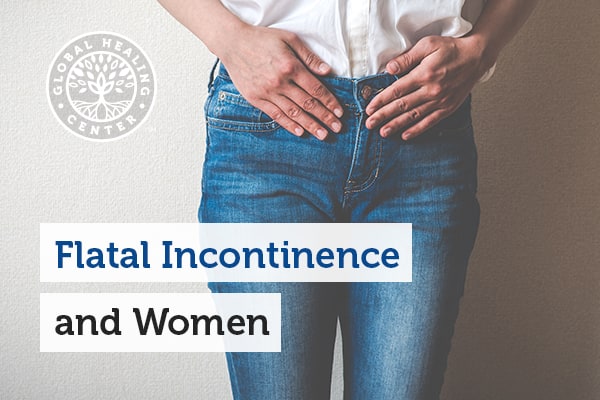Flatal Incontinence and Women: What is it and Why does it Happen?

Uncontrollable gas (flatus or flatulent gases) is known as flatal incontinence. This condition is defined as involuntary flatulence at least once or more per week. The big concern: it can happen anywhere. Involuntarily ‘breaking wind’ while at the store, restaurant or at the office creates embarrassing situations. It can erode self-confidence. It can negatively impact one’s relationships. Worse yet, the feeling of being powerless to control oneself can stress and isolate an individual. Unfortunately, it's a concern that afflicts women around the world.
Pregnancy, Childbirth and Uncontrollable Gas
During pregnancy and natural childbirth, the anal sphincter (the muscle that controls the anus) and the perineum muscles (the muscles of the pelvic area) suffer trauma. As a result, many women experience a loss of control over bowel movements and gas immediately following childbirth. While this is very common, it certainly isn’t desirable.
Studies have found that nearly 1 in 3 women who deliver vaginally report experiencing uncontrollable gas. For some women, the concern occurs for only a short time. For others, the concern becomes chronic. [1]
Researchers have sought to identify why this affects some women, but not others, particularly after pregnancy and delivery. One study linked the use of instruments, such as forceps or vacuum delivery, to an increased risk of trauma to the perineal muscles, resulting in flatal incontinence. [2]
The use of instruments during delivery doesn’t alone explain the concern. It has been noted that women who have multiple natural births report a higher incidence of flatal incontinence. While this might suggest a C-section might offer a way to prevent this concern, researchers have found C-sections did not offer protection against flatal incontinence. [3]
Maybe Childbirth is Not the Cause…
One study of Korean women and post-delivery anal and flatal incontinence did deliver an interesting result. The Korean women in this study experienced the trauma typical to a natural delivery, with lacerations to the sphincter occurring. Vacuum extraction was also used. Yet, the study reported flatal incontinence occurs nearly 20% less in Korean women than in women from Western countries, despite similar risk factors. [4]
Of course that leads to the question…
What Other Factors Contribute to Flatal Incontinence
Age appears a contributing factor to the concern of controlling gas. As the Korean study shows, the concern exists globally. Researchers from several countries report that about 1 in 3 women ages 30 and older suffer from the involuntary release of gas. [5] [6]
Another study identified menopause, obesity and an increased occurrence of urinary incontinence as factors that increased the likelihood of flatal incontinence. [7] This suggests additional factors can impact the ability of the perineal and anal muscles from functioning properly.
Research supports this idea. One study of women ages 18-50 reported stress significantly increased the chance of an involuntary release of flatus. [8] While childbirth has long been associated as a cause, this continued research demonstrates that the concern of flatal incontinence extends beyond birthing as a simple explanation.
Hope for Women Suffering from Flatal Incontinence
References (8)
- Casillas S, Hull TL, Zutshi M, Trzcinski R, Bast JF, Xu M. Incontinence after a lateral internal sphincterotomy: are we underestimating it? Dis Colon Rectum. 2005 Jun;48(6):1193-9.
- Chiarelli P, Murphy B, Cockburn J. Fecal incontinence after high-risk delivery. Obstet Gynecol. 2003 Dec;102(6):1299-305.
- Goldberg RP, Kwon C, Gandhi S, Atkuru LV, Sorensen M, Sand PK. Prevalence of anal incontinence among mothers of multiples and analysis of risk factors. Am J Obstet Gynecol. 2003 Dec;189(6):1627-30; discussion 1630-1.
- Jung E, Huh CY, Choe BK. Anal incontinence after childbirth: incidence in the Korean population. Gynecol Obstet Invest. 2008;66(4):248-52. doi: 10.1159/000148655. Epub 2008 Jul 31.
- Boreham MK, Richter HE, Kenton KS, Nager CW, Gregory WT, Aronson MP, Vogt VY, McIntire DD, Schaffer JI. Anal incontinence in women presenting for gynecologic care: prevalence, risk factors, and impact upon quality of life. Am J Obstet Gynecol. 2005 May;192(5):1637-42.
- Rømmen K, Schei B, Rydning A, H Sultan A, Mørkved S. Prevalence of anal incontinence among Norwegian women: a cross-sectional study. BMJ Open. 2012 Jul 30;2(4). pii: e001257. doi: 10.1136/bmjopen-2012-001257. Print 2012.
- Abramov Y, Sand PK, Botros SM, Gandhi S, Miller JJ, Nickolov A, Goldberg RP. Risk factors for female anal incontinence: new insight through the Evanston-Northwestern twin sisters study. Obstet Gynecol. 2005 Oct;106(4):726-32.
- Zutshi M, Hull TL, Bast J, Hammel J. Female bowel function: the real story. Dis Colon Rectum. 2007 Mar;50(3):351-8.
†Results may vary. Information and statements made are for education purposes and are not intended to replace the advice of your doctor. If you have a severe medical condition or health concern, see your physician.

Dr. Edward Group, DC
FOUNDER | HEALER | ADVOCATEDr. Group, DC is a healer and alternative health advocate, and an industry leader and innovator in the field of natural health who is dedicated to helping others. He is a registered doctor of chiropractic (DC), a naturopathic practitioner (NP), and proud alum of Harvard Business School and MIT Sloan School of Management. Dr. Group, DC is the founder of Global Healing – a mission and vision he has shared through best-selling books and frequent media appearances. He aims to spread his message of positivity, hope, and wellness throughout the world.










